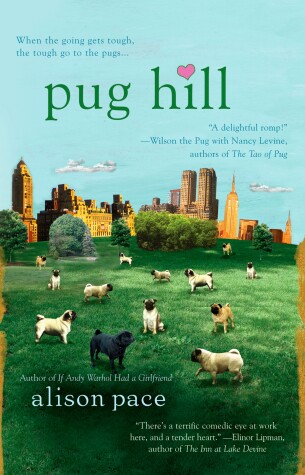
Leah
If the title hasn’t already clued you in, and you haven’t seen the book cover filled with pugs, then I’d like to let you know that Pug Hill is all about pugs. (I know, I am nothing if not obvious.) I mean, don’t get me wrong it’s about other things, too – Hope overcoming her fear of public speaking; Hope overcoming her crush on her girlfriended-up co-worker Elliott (no, I’m not entirely sure girlfriended-up is a word either, but it works, so it stays); Hope being Hope and overthinking everything; Hope overthinking her relationship with Evan (yup, despite crushing on Elliott, Hope has a boyfriend, named Evan). But, mostly, the novel is about the pugs and about Pug Hill. About how Pug Hill is Hope’s salvation; it’s where she goes when she needs to put the world to rights, when she needs to know there’s something that is solid in her life.
I will admit that I found the whole Hope overcoming her public speaking phobia to be both over the top (in a good way) and not as over the top as it should have been. I mean, the build up as Hope tries to overcome her public speaking is the over the top part, but the actual Hope trying to overcome her public speaking at her parents’ anniversary is rather brushed over somewhat. It sort of let the book down a bit for me. I mean, we’ve spent lessons with Hope as she tries to be able to speak freely in public without freaking out. We’ve spent hours at Pug Hill with her as she tries to overcome it. We’ve listened to why she can’t speak publicly, we’ve understood… So the end result should have had more time spent on it. It should have been bigger than it was. But sadly it wasn’t. It was all over much too quickly for my liking.
Pug Hill is very much about Hope; there are few secondary characters and the ones we meet are meetings that are rather brief (thankfully in Pamela’s case that’s a good thing, we barely even saw Pamela, Hope’s best friend, but I didn’t like her one bit). That can be good and bad; Hope was an excellent character, someone I liked immediately, someone I felt I clicked with (if that doesn’t make me some kind of weirdo), but it was disappointing to not get to meet more of Hope’s friends, more of Hope’s family. We heard of the things going on in Hope’s family (including some amusing conversations regarding a tent – oh, whoops, I hope Hope’s father doesn’t read my review; he doesn’t like tents…) which helped massively but it was a somewhat quiet novel without any other characters to get a grip of, however Hope makes up for it nicely.
Pug Hill was hugely enjoyable. I liked the pugs, I liked Hope, I liked the story, I just felt the conclusion was a bit of a let down. I got to the end of the book and, well, it didn’t feel finished. I thought maybe I was missing some pages (metaphorically speaking since I was reading it on my Kindle). But everything leading up to it was brilliant. Alison Pace knows her dogs, and I was in tears at the words she wrote about Captain, Hope’s parents’ ageing dog even though he was perfectly fine. (Honestly, I’m not lying; there was nothing wrong with him; it’s just… the way Pace writes and the way I imaginged Captain being so happy, it made me well up.) This is a tale for all dog lovers. No offense to those who don’t like dogs, but they generally sneer at books filled with dogs and unless you love dogs you won’t love Pug Hill. I loved dogs and I loved Pug Hill. I can’t wait to read A Pug’s Tale and be back with Hope and the pugs.
